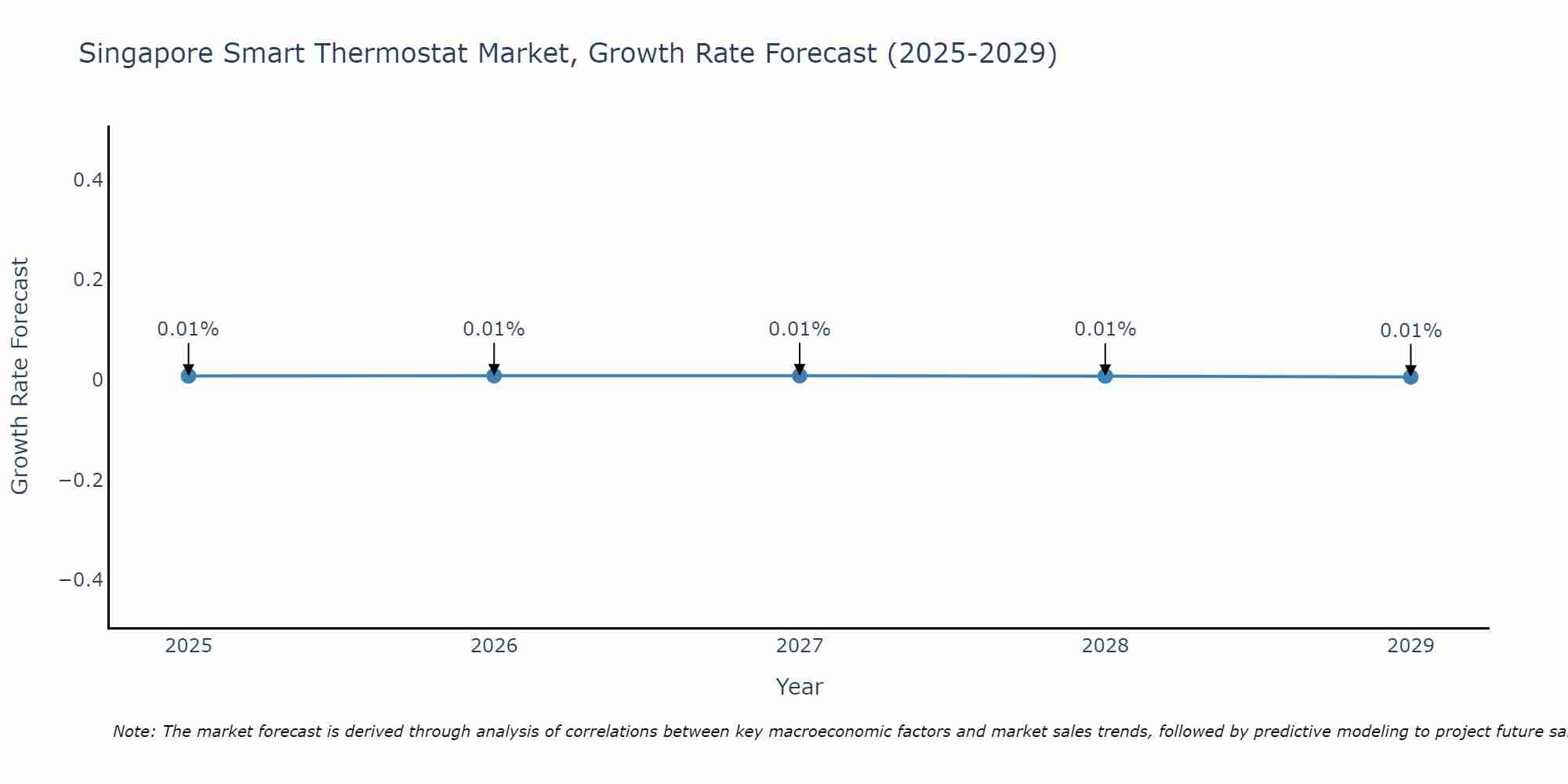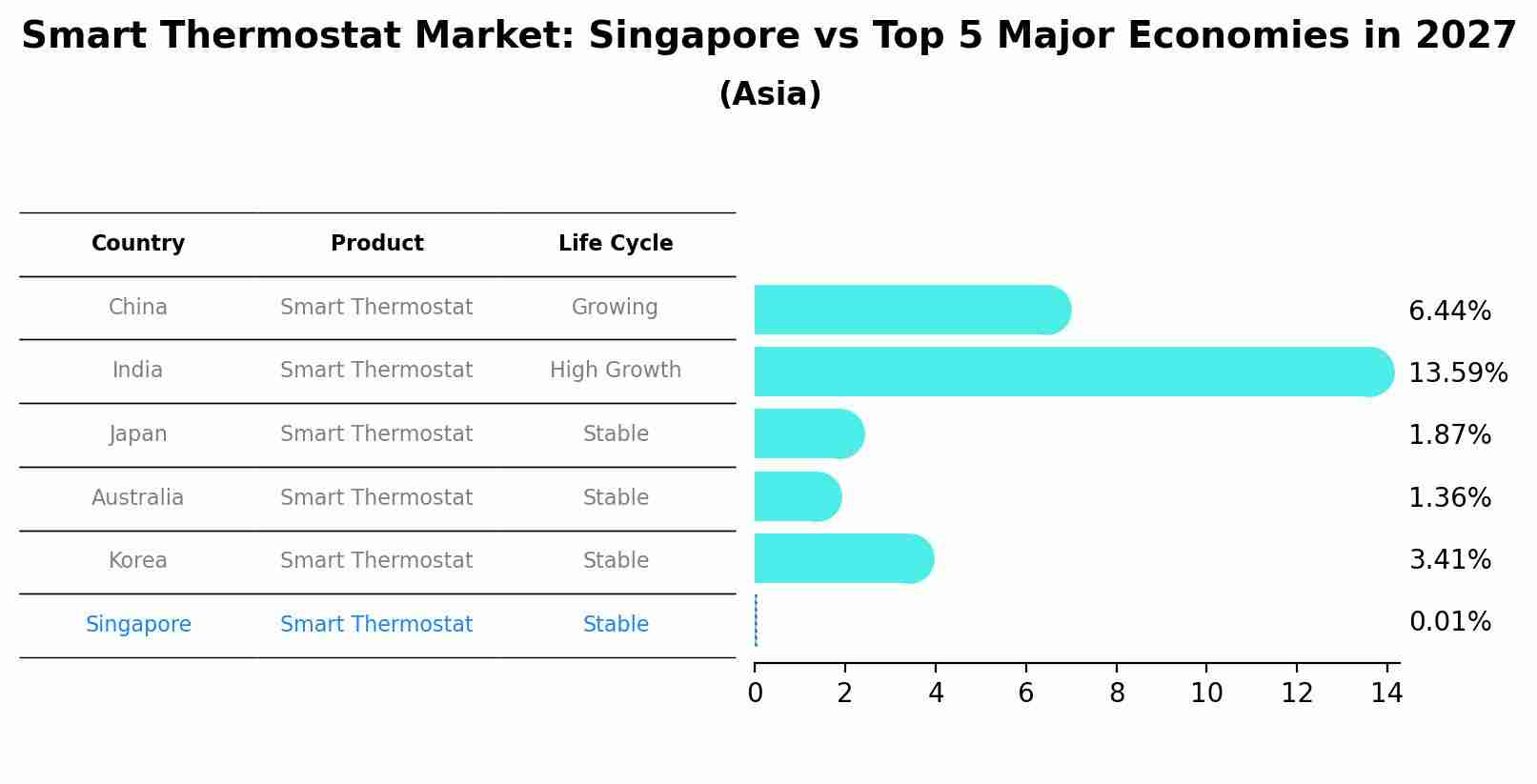Singapore Smart Thermostat Market (2025-2031) Outlook | Trends, Forecast, Analysis, Revenue, Industry, Size, Companies, Growth, Value & Share
| Product Code: ETC369507 | Publication Date: Aug 2022 | Updated Date: Apr 2025 | Product Type: Market Research Report | |
| Publisher: 6Wresearch | Author: Ravi Bhandari | No. of Pages: 75 | No. of Figures: 35 | No. of Tables: 20 |
Singapore Smart Thermostat Market Size Growth Rate
The Singapore Smart Thermostat Market is projected to witness mixed growth rate patterns during 2025 to 2029. Starting at 0.01% in 2025, the market peaks at 0.01% in 2027, and settles at 0.01% by 2029.

Smart Thermostat Market: Singapore vs Top 5 Major Economies in 2027 (Asia)
The Smart Thermostat market in Singapore is projected to grow at a stable growth rate of 0.01% by 2027, highlighting the country's increasing focus on advanced technologies within the Asia region, where China holds the dominant position, followed closely by India, Japan, Australia and South Korea, shaping overall regional demand.

Singapore Smart Thermostat Market Synopsis
The smart thermostat market in Singapore is expected to experience growth as energy-conscious consumers seek ways to optimize heating and cooling systems. Smart thermostats enable remote control and automation of HVAC (heating, ventilation, and air conditioning) systems. The market`s expansion is driven by the desire for energy savings and climate control convenience.
Drivers of the Market
The growth of the Singapore smart thermostat market is influenced by factors such as the demand for energy-efficient climate control, the adoption of smart home technologies, and environmental conservation efforts. Smart thermostats enable users to control and optimize heating and cooling systems. Growth drivers encompass the integration of smart thermostats with home automation systems, the use of machine learning algorithms for energy savings, and the connectivity of thermostats to mobile devices. As consumers seek ways to reduce energy consumption and enhance home comfort, the smart thermostat market is expected to grow, providing solutions for intelligent climate management.
Challenges of the Market
The adoption of smart thermostats in Singapore is hindered by factors like cost, compatibility, and user awareness. These devices can be expensive, deterring some homeowners. Compatibility issues with existing HVAC systems can also pose challenges during installation. Moreover, educating consumers about the energy-saving benefits and ease of use of smart thermostats is essential to drive their adoption.
COVID-19 Impact on the Market
The COVID-19 pandemic had notable effects on the Singaporean smart thermostat market. Initially, the market faced disruptions due to economic uncertainties and reduced demand for non-essential home automation products. However, as remote work became more prevalent, there was a resurgence in demand for smart thermostats to optimize home energy use. Manufacturers adapted by offering user-friendly and energy-efficient smart thermostat solutions. The pandemic accelerated the trend of smart home technology adoption, influencing market strategies.
Key Players in the Market
Prominent providers in the Singapore smart thermostat market, including Google LLC (Nest Labs), Honeywell International Inc., and Ecobee Inc., offer smart and connected thermostat solutions for efficient climate control and energy savings in homes and commercial buildings. Their expertise in smart home automation and energy management establishes their strong market presence.
Key Highlights of the Report:
- Singapore Smart Thermostat Market Outlook
- Market Size of Singapore Smart Thermostat Market, 2024
- Forecast of Singapore Smart Thermostat Market, 2031
- Historical Data and Forecast of Singapore Smart Thermostat Revenues & Volume for the Period 2021-2031
- Singapore Smart Thermostat Market Trend Evolution
- Singapore Smart Thermostat Market Drivers and Challenges
- Singapore Smart Thermostat Price Trends
- Singapore Smart Thermostat Porter's Five Forces
- Singapore Smart Thermostat Industry Life Cycle
- Historical Data and Forecast of Singapore Smart Thermostat Market Revenues & Volume By Type for the Period 2021-2031
- Historical Data and Forecast of Singapore Smart Thermostat Market Revenues & Volume By Wireless for the Period 2021-2031
- Historical Data and Forecast of Singapore Smart Thermostat Market Revenues & Volume By Wireless for the Period 2021-2031
- Historical Data and Forecast of Singapore Smart Thermostat Market Revenues & Volume By End-User Vertical for the Period 2021-2031
- Historical Data and Forecast of Singapore Smart Thermostat Market Revenues & Volume By Residential for the Period 2021-2031
- Historical Data and Forecast of Singapore Smart Thermostat Market Revenues & Volume By Commercial for the Period 2021-2031
- Singapore Smart Thermostat Import Export Trade Statistics
- Market Opportunity Assessment By Type
- Market Opportunity Assessment By End-User Vertical
- Singapore Smart Thermostat Top Companies Market Share
- Singapore Smart Thermostat Competitive Benchmarking By Technical and Operational Parameters
- Singapore Smart Thermostat Company Profiles
- Singapore Smart Thermostat Key Strategic Recommendations
Frequently Asked Questions About the Market Study (FAQs):
- Single User License$ 1,995
- Department License$ 2,400
- Site License$ 3,120
- Global License$ 3,795
Search
Thought Leadership and Analyst Meet
Our Clients
Related Reports
- Canada Oil and Gas Market (2026-2032) | Share, Segmentation, Value, Industry, Trends, Forecast, Analysis, Size & Revenue, Growth, Competitive Landscape, Outlook, Companies
- Germany Breakfast Food Market (2026-2032) | Industry, Share, Growth, Size, Companies, Value, Analysis, Revenue, Trends, Forecast & Outlook
- Australia Briquette Market (2025-2031) | Growth, Size, Revenue, Forecast, Analysis, Trends, Value, Share, Industry & Companies
- Vietnam System Integrator Market (2025-2031) | Size, Companies, Analysis, Industry, Value, Forecast, Growth, Trends, Revenue & Share
- ASEAN and Thailand Brain Health Supplements Market (2025-2031) | Strategy, Consumer Insights, Analysis, Investment Trends, Opportunities, Growth, Size, Share, Industry, Revenue, Segments, Value, Segmentation, Supply, Forecast, Restraints, Outlook, Competition, Drivers, Trends, Demand, Pricing Analysis, Competitive, Strategic Insights, Companies, Challenges
- ASEAN Bearings Market (2025-2031) | Strategy, Consumer Insights, Analysis, Investment Trends, Opportunities, Growth, Size, Share, Industry, Revenue, Segments, Value, Segmentation, Supply, Forecast, Restraints, Outlook, Competition, Drivers, Trends, Demand, Pricing Analysis, Competitive, Strategic Insights, Companies, Challenges
- Europe Flooring Market (2025-2031) | Outlook, Share, Industry, Trends, Forecast, Companies, Revenue, Size, Analysis, Growth & Value
- Saudi Arabia Manlift Market (2025-2031) | Outlook, Size, Growth, Trends, Companies, Industry, Revenue, Value, Share, Forecast & Analysis
- Uganda Excavator, Crane, and Wheel Loaders Market (2025-2031) | Strategy, Consumer Insights, Analysis, Investment Trends, Opportunities, Growth, Size, Share, Industry, Revenue, Segments, Value, Segmentation, Supply, Forecast, Restraints, Outlook, Competition, Drivers, Trends, Demand, Pricing Analysis, Competitive, Strategic Insights, Companies, Challenges
- Rwanda Excavator, Crane, and Wheel Loaders Market (2025-2031) | Strategy, Consumer Insights, Analysis, Investment Trends, Opportunities, Growth, Size, Share, Industry, Revenue, Segments, Value, Segmentation, Supply, Forecast, Restraints, Outlook, Competition, Drivers, Trends, Demand, Pricing Analysis, Competitive, Strategic Insights, Companies, Challenges
Industry Events and Analyst Meet
Whitepaper
- Middle East & Africa Commercial Security Market Click here to view more.
- Middle East & Africa Fire Safety Systems & Equipment Market Click here to view more.
- GCC Drone Market Click here to view more.
- Middle East Lighting Fixture Market Click here to view more.
- GCC Physical & Perimeter Security Market Click here to view more.
6WResearch In News
- Doha a strategic location for EV manufacturing hub: IPA Qatar
- Demand for luxury TVs surging in the GCC, says Samsung
- Empowering Growth: The Thriving Journey of Bangladesh’s Cable Industry
- Demand for luxury TVs surging in the GCC, says Samsung
- Video call with a traditional healer? Once unthinkable, it’s now common in South Africa
- Intelligent Buildings To Smooth GCC’s Path To Net Zero


















